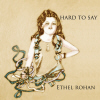Hard to Say
Hard to Say, recently published by PANK, contains a collection of short personal stories that will pluck at your heartstrings. Ethel Rohan, author of Cut Through the Bone and Dark Sky Books, executes the tone of youthful awkwardness with the perfect amount of bittersweet. The pangs of childhood tales and oddities resonate throughout the book, keeping the reader drawn until the finish.
Hard to Say, recently published by PANK, contains a collection of short personal stories that will pluck at your heartstrings. Ethel Rohan, author of Cut Through the Bone and Dark Sky Books, executes the tone of youthful awkwardness with the perfect amount of bittersweet. The pangs of childhood tales and oddities resonate throughout the book, keeping the reader drawn until the finish.
Set in Dublin, Ireland, Rohan tells the story of a family’s hardships from the perspective of the eldest daughter. A mother’s depression and dwindling eyesight form the dark cloud within each setting and influence the story and temperament of her children. The trauma of such events causes the narrator to live silenced and mostly misunderstood. Rohan accomplishes a genuine childhood perspective of innocence and pairs it with graceful detailed language to provide a well-rounded snapshot depiction within every scene.
Even through the perspective of a child, Rohan achieves a complex character that leaves the reader intrigued. The story “Robbed” exemplifies this character’s inner struggle of self-expression. After witnessing a robbery the narrator reflects: “I worried they’d spotted me and would come after me to silence me. Not that they needed to come hush me. I wouldn’t identify them. I wasn’t a telltale. No, I’d keep it inside, I was swollen, bursting, with all I knew not to say.”
Similarly, in the story “Fresh from God,” Rohan sets the scene with extraordinary subtleties that allows the scene to breathe on its own. After a neighbor visits an exhausted mother whom recently birthed her sixth child, the narrator reflects, “I walked down the street hauling something huge and invisible behind me. Mrs. Dolan’s words, that our family was finished echoed inside my head. She’d spoken in kindness, but her words came at me again and again, bats in a cave.” Rohan’s ability to create emotive instances with simplistic language of a child’s perspective works wonderfully. Not only does the reader relate to the child, but one also is overwhelmed with empathy for her story.
Continuous themes of abuse, neglect, and mother figures permeate each chapter. Some may view this as an issue of redundancy. The conflicts may seem trite, each chapter holding similar problems, with different settings. However, the skepticism fades when it becomes evident that these stories gather to comprise a whole entity by the end. One that not only chronicles the life of the narrator, but gives the character a voice worth listening to.
Childhood is always an intriguing theme. It deepens the understanding of ourselves through the trials and struggles of the characters. The author’s last few stories provide us with a mature character with a voice and decision to leave her home. Without the support of her parents or siblings the final chapters reveal her own sense of self that is ready to be unleashed. This satisfies a truly great ending to such a painful tale: the narrator can at last separate herself from her past and start anew.





